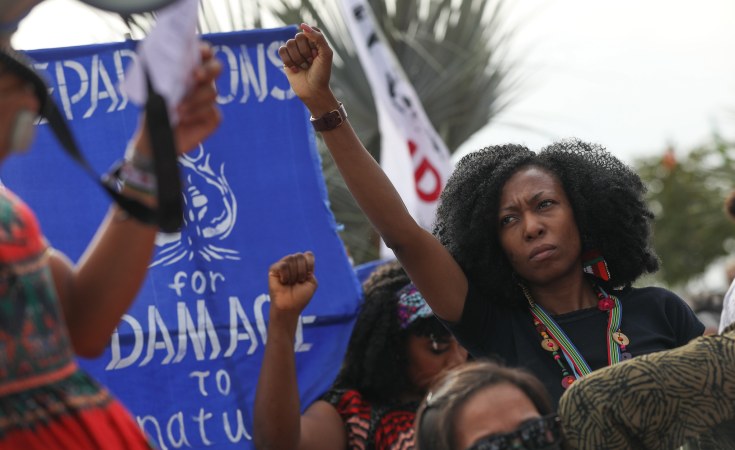Leaders must step up and prepare for the impacts of climate change in rural locations
Imagine you are standing in the blistering heat in a field. It is in the middle of a drought, which used to be a rare occurrence, but now an almost yearly event. The crops you would have sold to pay for your children's education, electricity and other household expenses are parched and withering.
This scene, sadly, is a reality in many African countries today.
According to the State of the Climate in Africa 2021 report, disrupted rainfall patterns, vanishing glaciers, shrinking lakes and destructive changes to continental water bodies are destroying agriculture, ecosystems and myriad biodiversity. By 2030, water loss will affect 250 million Africans and displace an estimated 700 million more.
According to the African Development Bank (AfDB), the increasingly frequent climate-related disasters are costing countries between $7 billion to $15 billion a year, with an estimated projection of these losses rising to $50 billion annually by 2030.
To adapt, African countries need to raise an annual average of $124 billion. Today, they are receiving only $28 billion a year.
While Africa is responsible for only about 3 per cent of global carbon emissions, it is being hardest hit by climate change. In its 2021 report, the Intergovernmental Panel on Climate Change revealed that the continent is warming faster than global average temperatures that could result in widespread devastating consequences. We need urgent and coordinated action to adapt to this prognosis.
Mitigation and adaption top the list of responses we can implement. Although related, they have distinct applications. Mitigation aims to lessen the severity of climate change effects by preventing or reducing emission of greenhouse gases into the atmosphere. Adaptation means adjusting to current and future effects of climate change, by altering our behavior, systems and -- in some cases -- our way of life.
With broad-based support, starting with leadership, climate adaptation for Africa is a real and achievable reality in our lifetime.
Adaptation: An analogy
Africa is much like a homestead, lush with greenery and an abundance of food where adults work diligently to provide for the young. In many families, work requires parents to be away from home for extended periods, leaving their children feeling alone and disconnected and the upkeep of their house neglected.
As their time spent at home decreases, these parents grow less aware of local threats. They are unaware of floodwater seeping into the house. They do not notice their children caught a cold due to dampness in the walls. They do not see the foundation of their house collapsing from water erosion.
Like these parents, our leaders are neglecting our home, Africa. This amazing continent houses the world's largest arable landmass; half of its remaining arable land; its second largest and longest rivers (Congo and Nile); and its second-largest tropical forest (20 per cent or 301 million hectares).
Africa contains 30 per cent of the world's mineral reserves; 12 per cent of its oil; 40 per cent of its gold; and 10 per cent of its internal renewable freshwater, savannas, coastlines and fisheries aquaculture, which together represent $24 billion.
Leaders best positioned to address these challenges are far moved from them. They typically reside in metropolitan areas and not in rural regions where people depend on nature for their resources. They cannot fully grasp the challenges nor develop safe and effective adaptation responses to lessen the impacts of climate change.
Yet, these natural resources are being assaulted by floods, droughts, zoonotic diseases and other weather calamities that threaten their demise.
Leaders best positioned to address these challenges are far moved from them. They typically reside in metropolitan areas and not in rural regions where people depend on nature for their resources. They cannot fully grasp the challenges nor develop safe and effective adaptation responses to lessen the impacts of climate change.
Consequently, Africans in remote locations, who lack access to gas or electricity for cooking and heating, log trees for firewood, deforesting and stripping away biodiversity,
Leadership must step up and prepare for the impacts of climate change in rural locations, as well as in urban centres.
Encouragingly, more than 40 African countries have revised their national climate plans. Most of these countries are in the process of creating strategies that are ambitious and make large commitments to climate adaptation and mitigation. These commitments must be accompanied by substantial financial investments.
Nature-Based Solutions (NBS) are gaining traction as an approach to adaptation. Drawing from natural systems to surmount climate-related challenges, NBS have the potential to be quite successful. Protecting forests and mangroves, for instance, could prevent $500 billion of climate-related losses each year.
At the 27th Conference of the Parties (COP 27) in Sharm el-Sheikh, Egypt, WWF was calling for bold commitments, including existing financial goals, to achieve multiple objectives for addressing adaptation needs. Highlights include:
- reducing greenhouse gas emissions
- accounting for loss and damage
- securing climate finance
- ensuring energy access and just transition,
- scaling up food systems approaches
- tapping into the potential of nature-based solutions
With broad-based support, starting with leadership, climate adaptation for Africa is a real and achievable reality in our lifetime.
- Alice Ruhweza is Africa Regional Director at World-Wide Fund for Nature International (WWF).


